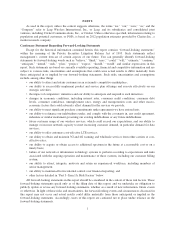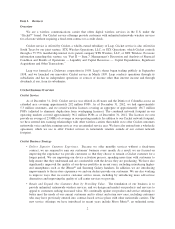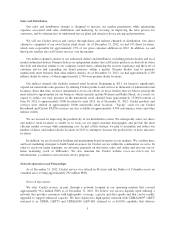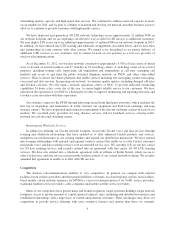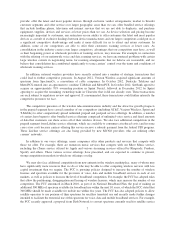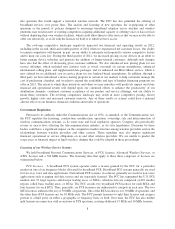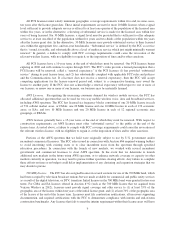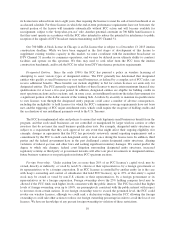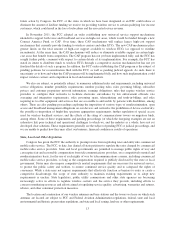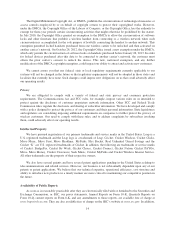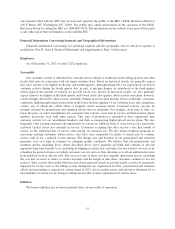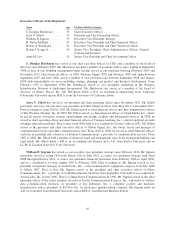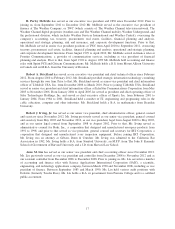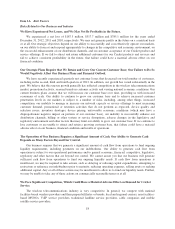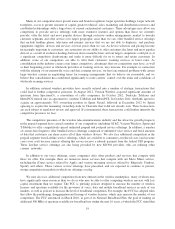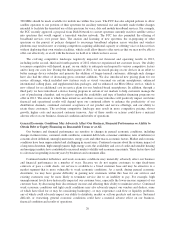Cricket Wireless 2012 Annual Report Download - page 24
Download and view the complete annual report
Please find page 24 of the 2012 Cricket Wireless annual report below. You can navigate through the pages in the report by either clicking on the pages listed below, or by using the keyword search tool below to find specific information within the annual report.its license term reduced from ten to eight years, thus requiring the licensee to meet the end-of-term benchmark at an
accelerated schedule. For those licenses in which the end-of-term performance requirements have not been met, the
unused portion of the license will terminate automatically without FCC action and will become available for
reassignment, subject to the “keep-what-you-use” rule. Another potential constraint on 700 MHz band licensees is
that they must operate in accordance with the FCC rules intended to reduce the potential for interference to public
reception of the signals of DTV broadcast stations transmitting on DTV Channel 51.
Our 700 MHz A block license in Chicago is an EA license that is subject to a December 13, 2013 interim
construction deadline. While we have been engaged in the first stages of development of this license to
supplement existing wireless capacity in this market, we must coordinate with the incumbent broadcaster on
DTV Channel 51 in order to commence operations, and we may be delayed in our ultimate ability to construct
facilities and operate on this spectrum. We thus may need to seek relief from the FCC from the interim
construction benchmark, and/or ask the FCC for relief from DTV interference protection requirements.
Designated Entities. Since the early 1990’s the FCC has pursued a policy in wireless licensing of
attempting to assist various types of designated entities. The FCC generally has determined that designated
entities who qualify as small businesses or very small businesses, as defined by a complex set of FCC rules, can
receive additional benefits. These benefits can include eligibility to bid for certain licenses set aside only for
designated entities. The FCC generally required holders of these licenses to meet certain maximum financial size
qualifications for at least a five-year period. In addition, designated entities are eligible for bidding credits in
most spectrum auctions and re-auctions, and, in some cases, an installment loan from the federal government for
a significant portion of the dollar amount of the winning bids. A failure by an entity to maintain its qualifications
to own licenses won through the designated entity program could cause a number of adverse consequences,
including the ineligibility to hold licenses for which the FCC’s minimum coverage requirements have not been
met, and the triggering of FCC unjust enrichment rules, which could require the recapture of bidding credits and
the acceleration of any installment payments owed to the U.S. Treasury.
The FCC has implemented rules and policies to ensure that only legitimate small businesses benefit from the
program, and that such small businesses are not controlled or manipulated by larger wireless carriers or other
investors that do not meet the small business qualification tests. For example, designated entity structures are
subject to a requirement that they seek approval for any event that might affect their ongoing eligibility (for
example, changes in agreements that the FCC has previously reviewed), annual reporting requirements and a
commitment by the FCC to audit each designated entity at least once during the license term. In addition, third
parties and the federal government have in the past challenged certain designated entity structures, alleging
violations of federal qui tam and other laws and seeking significant monetary damages. We cannot predict the
degree to which rule changes, federal court litigation surrounding designated entity structures, increased
regulatory scrutiny or third party or government lawsuits will affect our prior investments in designated entities,
future business ventures or our participation in future FCC spectrum auctions.
Foreign Ownership. Under existing law, no more than 20% of an FCC licensee’s capital stock may be
owned, directly or indirectly, or voted by non-U.S. citizens or their representatives, by a foreign government or
its representatives or by a foreign corporation. If an FCC licensee is controlled by another entity (as is the case
with Leap’s ownership and control of subsidiaries that hold FCC licenses), up to 25% of that entity’s capital
stock may be owned or voted by non-U.S. citizens or their representatives, by a foreign government or its
representatives or by a foreign corporation. Foreign ownership above the 25% holding company level may be
allowed if the FCC finds such higher levels consistent with the public interest. The FCC has ruled that higher
levels of foreign ownership, even up to 100%, are presumptively consistent with the public interest with respect
to investors from certain nations. If our foreign ownership were to exceed the permitted level, the FCC could
revoke our wireless licenses, although we could seek a declaratory ruling from the FCC allowing the foreign
ownership or could take other actions to reduce our foreign ownership percentage in order to avoid the loss of our
licenses. We have no knowledge of any present foreign ownership in violation of these restrictions.
10



